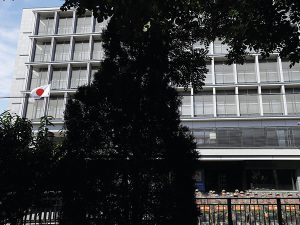Bloomberg
China temporarily detained a diplomat working at Japan’s embassy in Beijing this week, prompting protests from Japanese officials.
The person was briefly detained Monday afternoon by Chinese authorities, according to statements from Japan’s Ministry of Foreign Affairs and embassy, which said the actions were a breach of an international agreement protecting diplomats. The Chinese embassy in Tokyo rejected that complaint, saying the person had engaged in activities that were inconsistent with their identity as a diplomat and that the investigation was in line with China’s laws.
The latest spat adds to tense relations between Asia’s two largest economies. While China is Japan’s biggest trading partner, Tokyo has increasingly joined in with global criticism of its neighbor over human rights and other issues, and the two governments are locked in a standoff over sovereignty of a group of East China Sea islets. “This is something we cannot overlook,†Japanese Foreign Minister Yoshimasa Hayashi said Tuesday about the detention. “It’s absolutely unacceptable.â€
Japanese nationals are frequently detained in China, with details of the cases not officially revealed, though media reports say they are sometimes accused of spying. According to a report by Jiji Press last week, at least 15 Japanese people have been detained in China since 2015 on spying and other charges after the country passed an espionage law in 2014. The detention of a diplomat is more unusual.
Japan’s Vice Foreign Minister Takeo Mori called in acting Chinese Ambassador Yang Yu on Tuesday to protest the detention and demanded an apology, according to a statement on the Foreign Ministry website. The detention by the Chinese authorities is a clear violation of the Vienna Convention on diplomatic relations, the ministry said in the statement.
According to a separate release from the Japanese embassy in Beijing, the detained person was in the course of conducting their diplomatic duties. Japanese Ambassador Hideo Tarumi also protested to China’s Assistant Minister of Foreign Affairs Wu Jianghao in Beijing.
China’s Tokyo embassy said the country didn’t accept Japan’s “so-called representations†and urged the Japanese government to “strictly regulate the words and deeds of diplomatic personnel stationed in China.â€
 The Gulf Time Newspaper One of the finest business newspapers in the UAE brought to you by our professional writers and editors.
The Gulf Time Newspaper One of the finest business newspapers in the UAE brought to you by our professional writers and editors.
